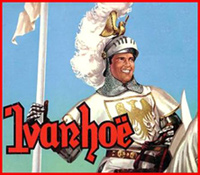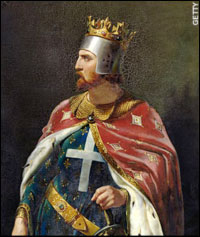Come listen to me, you gallants so free,
All you that loves mirth for to hear,
And I will you tell of a bold outlaw,
That lived in Nottinghamshire.
– From a Scottish Ballad, circa 1690
“…puts a brilliant spin on the traditional tales of Robin Hood and Maid Marian.”
School Library Journal on The Youngest Templar: Trail of Fate
So What is the Deal with that Richard the Lionheart?
Have you been to see Robin Hood at the theater yet? Interested to know more about the life and times of a medieval outlaw? You’ve come to the right place.
 As I’ve mentioned previously, the hero we know today, the single individual we call Robin Hood, is really a mash up of the exploits of several men throughout English history. From Ivanhoe by Sir Walter Scott, to countless other books and movies, Robin Hood is on the side of righteousness, leading his small, medium or large band of English Commoners in rebellion against the crown.
As I’ve mentioned previously, the hero we know today, the single individual we call Robin Hood, is really a mash up of the exploits of several men throughout English history. From Ivanhoe by Sir Walter Scott, to countless other books and movies, Robin Hood is on the side of righteousness, leading his small, medium or large band of English Commoners in rebellion against the crown.
But by far the most popular legends and most novels written about Robin Hood (or RH as I like to call him) are set during the reign of Richard the Lionheart during the Third Crusade. And that would include my own The Youngest Templar novels. So what is the story on this Lionheart guy?
 Richard was the Prince of Normandy before he became King of England. He was born to Henry II and Eleanor of Aquitaine. He lived most of his life in France and when he ascended to the throne, spent little time in England. He also spoke broken, heavily accented English and carried on most conversations in French. Richard spent so little time on English soil, his subjects referred to him as ‘the Absent King.’
Richard was the Prince of Normandy before he became King of England. He was born to Henry II and Eleanor of Aquitaine. He lived most of his life in France and when he ascended to the throne, spent little time in England. He also spoke broken, heavily accented English and carried on most conversations in French. Richard spent so little time on English soil, his subjects referred to him as ‘the Absent King.’
But one thing Richard did love to do was fight. He had a single-minded determination to free the Holy Land from the clutches of Saladin. He was never able to achieve this, since his and Saladin’s armies were so evenly matched, but he is given high marks as a tactician and military mind. He preferred spending his time in a campaign tent on the battlefield rather than sitting on a throne attending to ponderous affairs of state. It could be argued that Richard’s neglect of his monarchy is what led to the signing of the Magna Carta a few years after his death.
Richard’s reign lasted only ten years and most of that time his brother John and his mother Eleanor administered to the affairs of state. Richard was killed in France, laying siege to the castle of Chalus, when he rode to close to the castle and was felled by a crossbow bolt.





